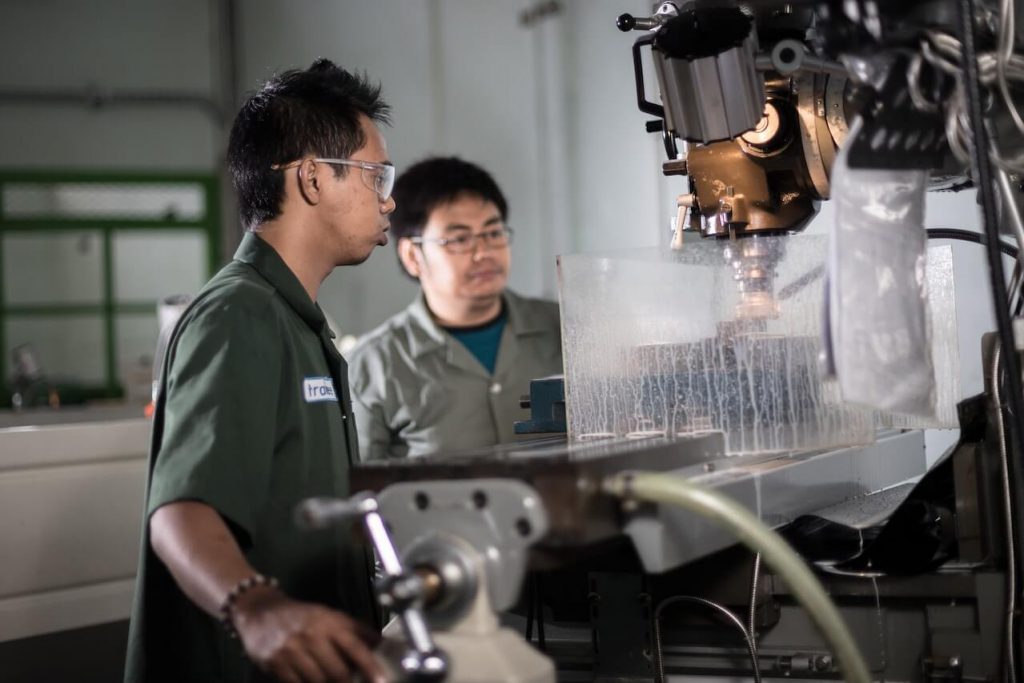As a professional operating in a machining environment, it is your utmost responsibility to factor in the risks around and within the shop while ensuring the safety & productivity of the workplace and the staff.
Get informed of the numerous risks and safety hazards of operating a machine shop. The size, the number of moving parts, high-speed motions, and sharpened cutting tools of a CNC machine alone makes them extremely dangerous.
So, here is an introductory guide to prominent risks and safety hazards linked with operations running on a machining shop floor.

1. Deep Cut Injuries
When machinists operate equipment inappropriately, without the proper technical knowledge, or with poorly maintained equipment, cuts and lacerations frequently happen.
However, not all accidents and fatalities in machine shops result from incorrect equipment handling. If mishandled, metal components and finished parts can be intensely sharp and cause lacerations.
Gloves, welding protection equipment like goggles & face masks, and other safety gear should be provided and mandated for all personnel who handle machinery with rotating parts or processed metallic components.
2. Amputation Risks
Any equipment powerful enough to carve through plastics, metals, or hardwood is easily susceptible to doing the same with skin and bone, which increases the danger of amputation.
Multiple body parts can be amputated, including toes, fingers, and even entire limbs, by tools, including saws, shaping machines, power presses, and bending machines. Operators must therefore keep a reasonable buffer from machine components to prevent any unintended impact.
3. Visual Impairment
Regrettably, vision-related injuries and impairments are rather prevalent among machine operators. They may be brought on by exposure to chemicals or projectiles like metal scraps, swarfs, screws, burs, and other material fragments.
All workers who frequently get exposed to this stuff should be provided with proper eyewear, as most machine shops regularly utilize a variety of harmful chemicals, lubricants, solvents, and cleaning products.
UV radiation damage to the eyes is another concern for anyone operating welding equipment or working close by.
4. Repetitive Motion-Related Risks
CNC Machine shop personnel may experience bodily harm from repetitive motion injuries due to prolonged lifting, unsettling postures, and repetitive movements.
If left untreated, repetitive motion-related injuries can render workers incapable of performing their duties and, if continued to worsen, have a severe and detrimental effect on their general quality of life.
Such injuries may surface due to strenuous actions, prolonged posture holding, or overuse of a particular muscle or set of joints. The simplest method to prevent them is to hold the perfect posture and take frequent pauses.
5. Crushes And Pinch Point Injuries
Crushes and pinch points frequently happen when massive, bulky equipment is unintentionally toppled or dropped. Additionally, workers face the danger of being run over by faulty machinery or large factory vehicles. Thus, crushes must be avoided because they nearly always result in fatalities.
You can prevent catastrophes brought on by crushes and pinch point accidents by training personnel on how to lift and handle the equipment correctly. Additionally, it would be best if you supplied your workers with sturdy lifting tools so they can move large objects conveniently.
Workers shouldn’t be reluctant to ask for assistance when moving/lifting bulky materials. Individuals qualified to operate heavy machinery should obtain regular safety instructions to ensure they don’t get themselves or their colleagues in trouble.
6. Electrocution Hazards
Substantial electrical loads are needed in a manufacturing and production setting to power the machinery, lighting, exhaust systems, and other ambient air management tools and keep workers secure and productive.
However, if machine shop operators are not cautious, these large electrical loads could threaten their lives.
Therefore, maintaining all the wiring systems, sockets, and electrical components in excellent condition, which necessitates the assistance of a professional electrical contractor, is a significant factor in ensuring that workers don’t get exposed to the hazard of electric shocks or electrocution.
A qualified, experienced industrial electrician will be competent to develop a strategy that addresses worker safety without compromising the machine shop’s electrical requirements.
Furthermore, regular checks must also be performed to ensure everything is functioning correctly.
7. Hazards Associated With Inhalation of Toxic Substances
Machine shops frequently release dangerous fumes and chemical substances that could be inhaled by workers nearby. Cleaners, solvents, chemicals, metal fumes, dust, and oil mist are the most common inhalation-related concerns, such as during welding-related activities.
Employers are responsible for protecting personnel from hazardous leftover chemicals, toxins, and gases by providing them with protective gear and monitoring the indoor environment’s air quality.
To maintain healthy air quality standards within the machining facility and shield your workers from harmful exposure, consider installing mist & dust collectors, air purifiers, exhaust systems, biofilters, etc.
Concluding Remarks
Precaution and preventive actions are crucial since machine shops can pose enormous worker health-associated risks and hazards. As a result, implementing and practicing good work instructions is essential to maintaining safety in a machine shop. Use REWO to create clear safety instructions for your shopfloor.
